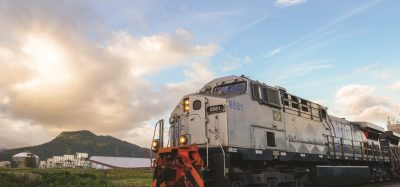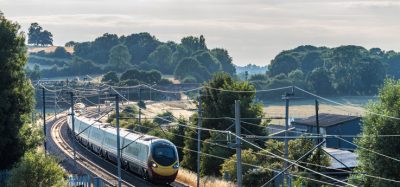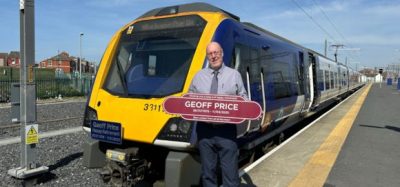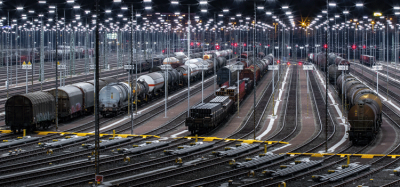In safe hands
Posted: 6 February 2007 | | No comments yet
Translink is the brand name for the company that provides integrated public transport services in Northern Ireland: NI Railways, Ulsterbus and Metro. As a top brand in Northern Ireland, Translink is implementing a significant programme of change, which will enhance the future development and growth of public transport in the region. Major changes are occurring across the company in order to attract more passengers and deliver the challenging targets set out in the Government’s Regional Transportation Strategy (RTS).
Translink is the brand name for the company that provides integrated public transport services in Northern Ireland: NI Railways, Ulsterbus and Metro. As a top brand in Northern Ireland, Translink is implementing a significant programme of change, which will enhance the future development and growth of public transport in the region. Major changes are occurring across the company in order to attract more passengers and deliver the challenging targets set out in the Government’s Regional Transportation Strategy (RTS).
Translink is the brand name for the company that provides integrated public transport services in Northern Ireland: NI Railways, Ulsterbus and Metro. As a top brand in Northern Ireland, Translink is implementing a significant programme of change, which will enhance the future development and growth of public transport in the region.
Major changes are occurring across the company in order to attract more passengers and deliver the challenging targets set out in the Government’s Regional Transportation Strategy (RTS).
NI Railways delivered a number of major improvements to rail travel in Northern Ireland over the 2005/06 period. Funding for 23 new trains was secured for the network in December 2000, and the first deliveries commenced during April 2004 and by October 2005, all were introduced into passenger service. For passengers, this means they can travel on state-of-the-art trains that meet the highest standards in terms of safety, accessibility and journey comfort.
Representing an investment of over £80 million, this marked the beginning of a very exciting period for NI Railways and a significant step in the renaissance of rail travel in Northern Ireland and for public transport in general.
Safety as a priority
The introduction of new trains posed potential new safety issues – mainly due to the fact that they are considerably quieter and faster than their predecessors. In addition they also have a range of specific safety features on board, for example CCTV both inside and also externally to show the track.
Safety of our passengers and for the public is of paramount importance to NI Railways and indeed is one of the company’s core objectives which is highlighted by the proactive commitment to safety across the company, and as a direct result, the number of injuries and fatalities on NI Railways lines are minimal.
Train Protection Warning Systems
NI Railways are nearing completion of introducing Train Protection Warning Systems (TPWS) across the local network and on all passenger trains. Installation of all units is due to be completed by February 2007.
TPWS have been introduced onto the Northern Ireland railway network as a preventative measure. In the rare eventuality of a train breaking a stop signal or approaching the signal at too fast, the TPWS will activate, causing the train to slow down, eventually bringing it to a halt with an emergency stop if necessary.
The introduction of TPWS has been approved primarily as a further investment in public safety with a financial cost of £4 million. The programme was approved after a risk assessment was carried out to identify ‘hot spots’ on the network. The new systems will increase safety levels for our passengers and staff both by protecting trains from serious over-runs and by preventing train movement into hazardous sections of line which are already occupied by other moving trains.
TPWS equipment has been fitted to all new C3K and older Class 80 and 450 trains still in operation. The system is currently operational where a fitted train and a fitted signal meet.
Upgrade of level crossings
NI Railways have invested in the upgrade of a number of level crossing systems in various locations including Moira, Trummery, Trooperslane and Jordanstown. The upgrades were carried out after NI Railways employed an independent company to carry out a full risk assessment designed to identify crossings which were of a high risk of misuse by car users and other members of the public.
As a result, these crossings have been upgraded from AHB’s to full barriers with shirts. These offer the advantage of:
- Prevention of vehicle ‘zig-zag’
- Protection against cars coming to a stand-still on the crossing as a result of traffic tail backs and becoming trapped when the AHB is activated automatically by the train approaching
- Full barrier CCTV has been installed with the result that the signaller cannot clear the protective signal until the barriers are down and the crossing is clear
- Greater level of protection of the line
Close Circuit Television (CCTV) has also been installed at a number of level crossings in order to monitor the actions of those using the crossings.
NI Railways have a stringent safety policy and where possible will prosecute members of the public, both pedestrians and motor vehicle users, who misuse these crossings. The company offers a cash reward of up to £1,000 to any member of the public who witnesses any incident of trespass, vandalism or assault against a member of staff and is prepared to give evidence in court resulting in a conviction.
In addition to CCTV at crossings, there is an ongoing policy programme to install digital CCTV as a security feature in various locations across the NI Railways network including at station facilities, Park and Ride sites and station halts. The footage is used to capture instances of dangerous behaviour by members of the public which could result in evidence leading to a successful prosecution. In addition, where surveillance is used as a proactive preventative measure, many people simply do not engage in either misdemeanours or anti-social acts when they know their behaviour is being recorded.
Warning lights are also active at every crossing in order to effectively alert members of the public, either on foot or in a vehicle, that a train is approaching the level crossing. The public must wait behind the designated line until the barriers rise and the lights indicate that it is safe to cross. The warning lights are specifically installed at level crossings to attract the attention of, and to instruct members of the public how to use the crossings properly.
Private/user working crossings
NI Railways also have numerous private or user working crossings on the network. Two years ago, approximately 380 private crossings existed, however many of these had not been used in many years and have since been closed. All existing private crossing have been risk assessed and a new risk model was developed for this purpose. Risk assessments are reviewed annually or more frequently if conditions change, for example all risk assessments of crossings were reviewed earlier this year due to changes in line speeds and an increase in frequency of services.
All crossings undergo a condition survey carried out by a NI Railways appointed maintenance contractor twice a year. The maintenance contractor is also responsible for responding to urgent reports from users relating to problems caused by vegetation or surface conditions. A cross-departmental management team meet every two months to ensure a proper strategy and full management of all risks at crossings are implemented and developed through a variety of initiatives.
Miniature Stop Lights (MSL) are currently being installed at a number of private crossings, however it must be noted that they are not appropriate for all crossings. A crossings investment appraisal model is used to determine the financial viability of these lights, and it is then necessary to establish whether they are appropriate for the users.
As an additional safety measure, 25 of the private crossings on the NI Railways network have been fitted with telephones which are connected to the controlling signaller. A database of crossing owners and users is also maintained and enables NI Railways to write to users to encourage the safe use of crossings, plus we also distribute leaflets and posters to those living on or near crossings and also target other organisations whose staff use the crossings such as Royal Mail and National Health Service employees etc. A ‘crossings booklet’ is due to be launched which will provide details on how to use crossings safely, the legalities of using crossings and NI Railways’ company position, what to do in emergencies and special instructions for farmers etc.
New legislation has also been introduced in Northern Ireland which can impose a maximum £1,000 fine on those misusing crossings. The ‘Private Crossings (Signs and Barriers) Regulations 2006’ should help NI Railways to improve enforcement measures.
In addition, the company are committed to implementing policies and practices that will further reduce risks associated with these crossings including bridge building, telephone installation, resurfacing, new signage, new fencing and gates, improving sight lines, land purchase, rerouting, consolidation of a number of crossings into one and converting road crossings into pedestrian crossings. The company’s first objective with any crossing is to close it if possible, however when this is not a viable option, measures will be taken if necessary to increase safety. For example, a large shed was recently removed from a field to improve the sighting distance for a number of crossings.
‘Dead Cert’ PR safety campaign
NI Railways have introduced a wider, dedicated PR safety campaign entitled ‘Dead Cert’. This campaign has been rolled out over the last two years across Northern Ireland and a new message ‘Don’t Cross the Line’ has been added more recently in an attempt to support measures taken to eradicate the illegal us of level crossings. The campaign includes media advertising and is supplemented by additional proactive PR activity with supporting news releases and photographic evidence of what has been classed as ‘near misses’. The key messages of the Dead Cert campaign are:
- Faster trains are harder to see, quieter trains are harder to hear
- Don’t take chances – keep off the tracks
- Real dangers – don’t mess on platforms
- CCTV can C U – C U in court
- Don’t cross the Line
- C U in court (prosecutions highlighted)
- The right to work without fear (zero tolerance to staff abuse)
Each message was endorsed with the hard hitting catchphrase ‘It’s a Dead Cert’.
This campaign is an essential part of NI Railways ongoing safety initiatives as a total of 32 incidents of level crossing misuse, including motorists driving through closed crossings with high-speed trains less than seconds away, were reported locally in the last year.
As part of the Dead Cert campaign, a DVD entitled ‘TravelSafe’ has been produced for young people and addresses the possible consequences of misbehaving on or near railway property. The DVD’s are distributed via our local managers and are used by schools and community groups to further promote safety measures to young people, there are currently 1,200 in circulation and are provided free of cost on demand.
Passenger safety onboard trains
NI Railways are committed to ensuring that the highest standards of safety are adhered to and this is also implemented onboard our services. All trains in service have a conductor onboard at all times. Approximately eight on-train security operations are carried out each month which use a team of personnel made up of railway staff, a private security firm and members of the Police Service of Northern Ireland (PSNI).
Major events and holidays in Northern Ireland, such as Easter Monday, the Balmoral Show (major agricultural show) and North West 200 (motorcycle race), often attract significant additional numbers onto the railway which can cause security and safety concerns due to the volume of people onboard scheduled services. NI Railways also introduce and promote special family tickets for these occasions and work very closely with the PSNI to carry out joint risk assessments with the PSNI when necessary to ensure these particularly busy periods are managed effectively with passengers boarding and disembarking at their stops without incidents.
NI Railways have proactively created and maintained effective relationships with the wider PSNI and community groups who live near railway property across Northern Ireland. This network of contacts is crucial when anti-social behaviour or incidents occur, to assist in identifying and apprehending offenders and we rigorously enforce the Railway By-Laws and NI Railways’ legal department will prosecute offenders where possible. A strict no alcohol policy was introduced on to the network in January 2005 which is enforced on a daily basis as a further deterrent for unsafe or anti-social behaviour.
Customer care personnel have been employed within all main stations to provide passengers with service information and to ensure the safety of all passengers and staff within the station. Continuously recording CCTV has also been installed on all C3K trains with clear sight of the whole car.
Safety features onboard include fire extinguishers at each door, ‘call for aid’ buttons located throughout the train, ‘Emergency Stop’ alarms, emergency hammers which are housed in glass cases above the windows and a first aid box which is kept in an emergency cupboard.
The security of railway personnel is also hugely important and a Staff Protection Group meets quarterly to review policies and practices To ensure staff safety, a refuge area onboard our trains is provided for staff if needed. Excellent working relationships with the PSNI ensure that a quick response to emergency calls from staff and direct lines of communication are open when needed.
The health and safety of all our passengers, staff and vehicles is of paramount importance at all times and NI Railways are committed to providing the best standards and highest quality available. NI Railways will continue to research and invest in the most appropriate safety standards and devices available to the Northern Ireland local railway network.
Conclusion
With investment in rolling stock, infrastructure and associated safety measures, NI Railways is enjoying significant improvements in punctuality and reliability performance. These improvements benefit both public perception and confidence and as a direct result, passenger numbers have increased significantly and NI Railways must now rank as one of the fastest growing railways in Europe.
About the author
Mr. Mal McGreevy graduated from Queen’s University, Belfast in 1977. After gaining broad engineering management experience in various industries, Mr. McGreevy was appointed Workshops Manager in 1988 for Ulsterbus Ltd. In 1991, Mr. McGreevy became Chief Engineer of Ulsterbus and Citybus Ltd, but later became the Engineering Executive of Translink taking mechanical responsibilities of NI Railways rolling stock. Mr. McGreevy undertook the role of General Manager for Rail Services of NI Railways in April 2004.








